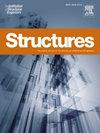用于钢筋的拉伸石墨烯改性冷喷锌涂层的防腐蚀性能
IF 3.9
2区 工程技术
Q1 ENGINEERING, CIVIL
引用次数: 0
摘要
冷喷锌技术因其环保性和施工便捷性,在金属防腐领域具有独特的优势。然而,与热浸镀锌相比,其防腐性能仍有待提高。石墨烯作为填充材料,能有效增强涂层的防腐性能。然而,石墨烯改性冷喷锌镀层对氯离子诱导的金属腐蚀的耐受性仍然未知。本研究采用冷喷锌涂层和石墨烯改性锌涂层对钢筋施加不同程度的拉伸应力。通过电化学测试和显微分析,研究了拉伸锌涂层钢筋在模拟混凝土孔隙溶液中的钝化和去钝化过程。研究结果表明,与普通冷喷锌镀层相比,石墨烯改性镀层在不同拉伸应力水平下都能显著提高镀层的耐腐蚀性并降低钢筋的腐蚀速率,这归功于石墨烯的高比表面积。然而,由于石墨烯导致锌粉之间的不连续性,石墨烯改性锌涂层表面无法形成完整的钝化膜,导致其抗氯离子诱导的去钝化能力较低。这项研究表明,石墨烯改性冷喷锌涂层不适合海洋环境。本文章由计算机程序翻译,如有差异,请以英文原文为准。
Corrosion protection performance of stretched graphene-modified cold-sprayed zinc coating for steel rebar
The cold-sprayed zinc technology exhibits unique advantages in the field of metal corrosion prevention due to its environmental friendliness and convenient construction. However, compared to hot-dip galvanizing, there is still a necessity to improve its corrosion resistance. Graphene as a filler material, effectively strengthens the anticorrosive properties of the coating. Nevertheless, the resistance of graphene-modified cold-sprayed zinc coating to chloride ion induced metal corrosion remains unknown. In this study, cold-sprayed zinc coating and graphene-modified zinc coating were employed to steel rebar that was subjected to different levels of tensile stress. The passivation and de-passivation process of the stretched zinc-coated rebar in the simulated concrete pore solution were investigated with electrochemical tests and microscopic analyses. The research findings reveal that compared with ordinary cold-sprayed zinc coating, graphene-modified coating can significantly improve the coating resistance and reduce the corrosion rate of rebar under different levels of tensile stress attributed to the high surface area of graphene. However, due to the discontinuity between zinc powders induced by graphene, a complete passivation film cannot form on the surface of graphene-modified zinc coating, which resulted in a lower resistance against chloride ion induced de-passivation. This study indicates that graphene-modified cold-sprayed zinc-coating is not fit for marine environment.
求助全文
通过发布文献求助,成功后即可免费获取论文全文。
去求助
来源期刊

Structures
Engineering-Architecture
CiteScore
5.70
自引率
17.10%
发文量
1187
期刊介绍:
Structures aims to publish internationally-leading research across the full breadth of structural engineering. Papers for Structures are particularly welcome in which high-quality research will benefit from wide readership of academics and practitioners such that not only high citation rates but also tangible industrial-related pathways to impact are achieved.
 求助内容:
求助内容: 应助结果提醒方式:
应助结果提醒方式:


